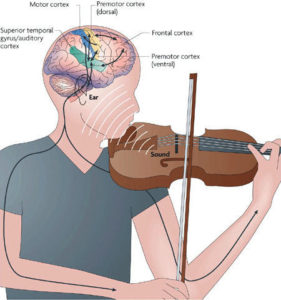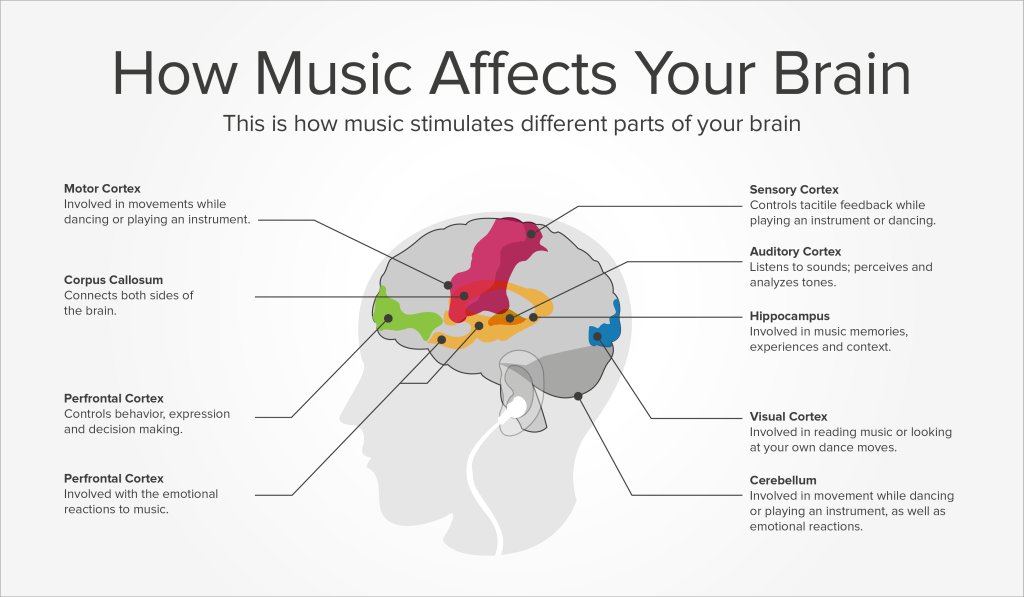CAN MUSIC INCREASE OUR STUDYING ABILITY?
Can music affect our ability to perceive and remember information? How does music affect our brain and psycho-emotional state? Well, we can divide all musical works into activating, tonic, and relaxing, soothing. The perception of music is closely connected with mental processes; it requires attention, observation, quick wit. Music, perceived by the auditory receptor, affects the general condition of the whole organism, causes reactions related to changes in blood circulation, respiration.
For musicians, things are even better, especially for those who have been playing musical instruments since childhood. According to some studies, the study of music contributes to the sustainable development of performance techniques and non-verbal thinking. In an interview with News in Health, a neuroscientist at Harvard Medical School, Dr. Gottfried.
Music can also have a significant effect on our health. Since 1969, a music therapy society has existed in Sweden. They found out that the sounds of bells containing resonant ultrasonic radiation could kill typhoid bacilli, pathogens of jaundice, and influenza viruses in a matter of seconds.
Can Listening to Music Help Us in Studying?
According to the American Psychological Association, 50% of students listen to music for 1-1.5 hours during the day, 28% – less than 30 minutes, and 19% – 2-4 hours a day. 95% of respondents believed that music has a calming and relaxing effect. 79% of students say music beneficially affects their performance. The analysis of correlations showed that these students have high academic performance and note psycho-emotional stability (lack of mood swings) and the prevalence of positive emotions over negative ones (78% often experience joy and enthusiasm). Students prefer melodic (70%) and energetic (50%) music, and in the first place – popular music (43%), in the second – classical music (31%), in the third – rock music (18%).
Students are very susceptible to various stress factors that depress both their moral and physical condition. As a way of solving a problem, a student may try a custom essay service if one needs some help with the assignments. However, the beneficial effect of music improves performance and allows the student to be emotionally and psychologically stable. It is these qualities and abilities necessary for good academic performance. We associate the positive influence of music on human life activity not only with its ability to relax and relieve psycho-emotional stress, but also with the ability to change moods and, as a result, mobilize internal forces and resources of personality. If you find that you are still struggling to develop strong studying habits, the BetterHelp therapy platform can pair you with an expert to help you.
Music for Child Development
As a result of numerous studies, it has been scientifically established that music contributes to the more active development of children. Many mothers practice music therapy even for babies still in the womb. Of course, the child begins to perceive the text of songs only at a more mature age, but the ability to recognize the melody to one degree or another is observed even before birth. How exactly does the influence of music on the development of children, including preschool age, manifest itself? Among the positive effects of listening to the baby, you can highlight the following:
- Improving memory. The child remembers the melody and text, and this happens, rather, on a subconscious level.
- Formation of speech. Singing along to his favorite songs, the kid trains his articulate skills.
- Music therapy as a way to control the emotional state of the child. Excessively active and easily excitable babies relax better with calm music. And funny and perky melodies will help to stir up and cheer up passive kids.
- Development of creative abilities. Listening to music, the child learns to interpret and understand it, which means that the imagination is actively involved in the process.
- Development of written and mathematical abilities. Surprisingly, regular listening to music also affects the child’s ability to write and count. There is a scientific explanation for this – music develops spatial perception.
Not all adults can boast of love for classical music. To most, it seems too boring and complicated for daily listening. However, child psychologists claim that the influence  of classical music on the psyche of children is enormous.
of classical music on the psyche of children is enormous.
Everything is very individual. Some kids, upon hearing the sounds of the orchestra, throw a tantrum, others – are energized or, conversely, completely calm down. The reaction of children depends directly on temperament, and for each, you need to make an individual music program.
The benefits of classical music for children of all ages are scientifically proven. Regular listening to Mozart, Bach, Chopin, and other “golden” composers noticeably develops the child’s creative, mental, and communicative abilities. There is even the so-called “Mozart Effect,” derived by the French otorhinolaryngologist A. Tomatis.
He boils it down to the fact that children listening to the works of Mozart demonstrate a more dynamic development of thinking than their peers who do not listen to the music of this composer. The doctor explains this phenomenon with a special tonal range, characteristic of the works of Wolfgang Amadeus. Of course, it is too early to talk about the full manifestation of the effect, but the fact remains – classical music contributes to a more active mental and creative development of children.

